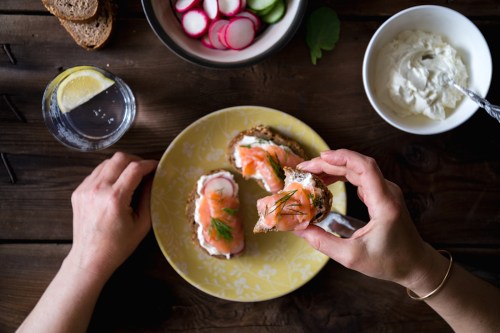When I picture myself in my older years, I like to hope that my mind will be just as sharp as Sophia on Golden Girls. Sure, I still want to be able to go for walks around the neighborhood and get in on any shuffleboard games going on, but I definitely want my brain to still be strong, too. As with any health goal, preparing for the future means thinking in the present.
Experts in This Article
functional medicine doctor and author of Young Forever
Functional medicine doctor Mark Hyman, MD is passionate about brain health tips, too. He talks about it a lot in his books, specifically focusing on how food can benefit brain health both in the immediate and long-term. And this week, he revealed his number one favorite brain-boosting food on Instagram. Can you guess what it is? Fish!
“Seafood is one of the best dietary sources of protein around, and it’s chock-full of nutrients like iodine, selenium, vitamin D, and B12,” Dr. Hyman wrote in the caption of his post. “But the biggest health benefits of fish comes from the two omega-3 fatty acids that we get from them and nowhere else.” He adds that these polyunsaturated fats—specifically DHA and EPA—are strongly linked to benefitting both the heart and the brain. (Love a multitasking food.) “Large studies have found that omega-3 fats also protect you from type 2 diabetes, inflammation, autoimmune disease, and even depression,” Dr. Hyman adds.
Of course, there’s a lot of fish in the, er, sea so the next question becomes what type of fish to buy. Dr. Hyman’s favorites are sardines, anchovies, mackerel, herring, rainbow trout, and wild salmon—all of which have the highest amounts of DHA and EPA. He recommends minimizing the amount of tuna, swordfish, king mackerel, catfish, Chilean sea bass, and tilefish you consume because they tend to be higher in mercury.
It’s also important to consider sustainability when shopping for fish, and there are some helpful labels that can help. The main one to look for is the Marine Stewardship Council, which takes into account codes and guidelines provided by the UN Food and Agriculture Organization (FAO), ISEAL, and the Global Sustainable Seafood Initiative (GSSI). These standards require fisheries to combat overfishing, have a minimal impact on the environment, and other requirements.
Even if you’re not going grocery shopping as often, you can still stock up on brain-healthy fish by buying frozen seafood, which will last longer and also tends to be less expensive. “Fish can be even more nutritious when frozen,” registered dietitian Tracy Lockwood Beckerman, RDpreviously told Well+Good. This is because it’s typically frozen almost as soon as it’s caught, which preserves nutrients at their peak.
Will taking fish oil supplements give you the same benefits as eating seafood? Watch the video below to find out:
So next time you’re at the grocery store and want to fill your cart with something you know will benefit your brain, you know what to do: go fish.
Oh hi! You look like someone who loves free workouts, discounts for cult-fave wellness brands, and exclusive Well+Good content. Sign up for Well+, our online community of wellness insiders, and unlock your rewards instantly.
Sign Up for Our Daily Newsletter
Get all the latest in wellness, trends, food, fitness, beauty, and more delivered right to your inbox.
Got it, you've been added to our email list.











